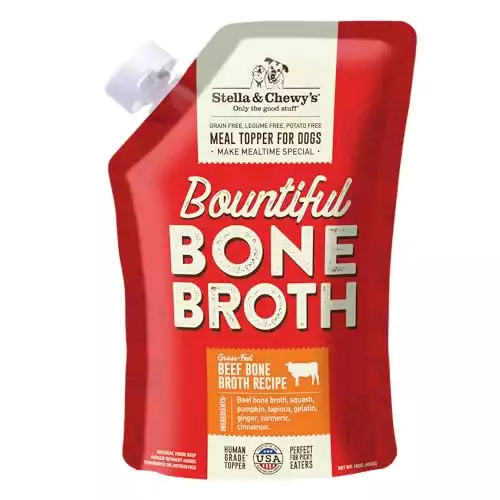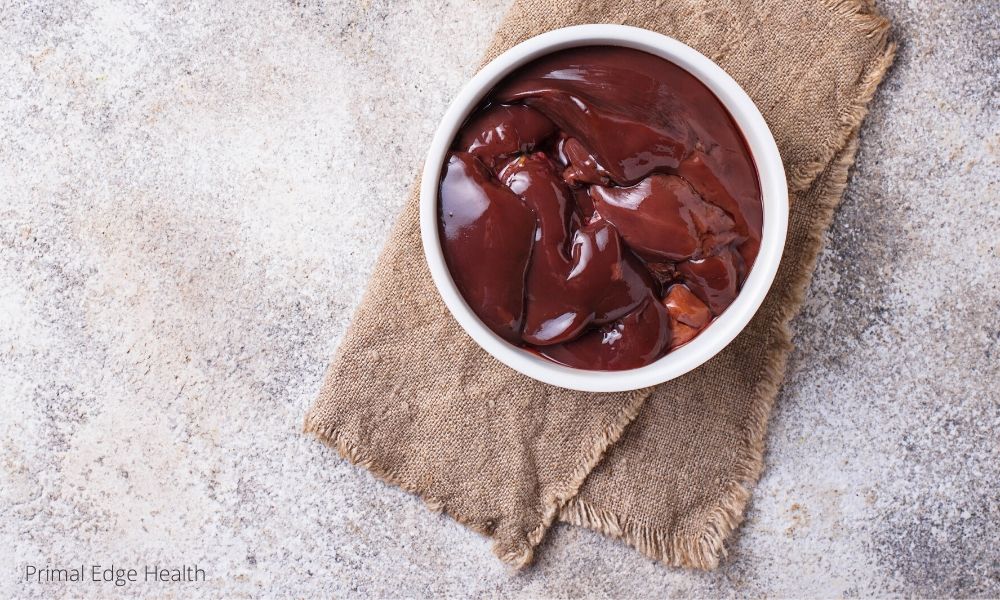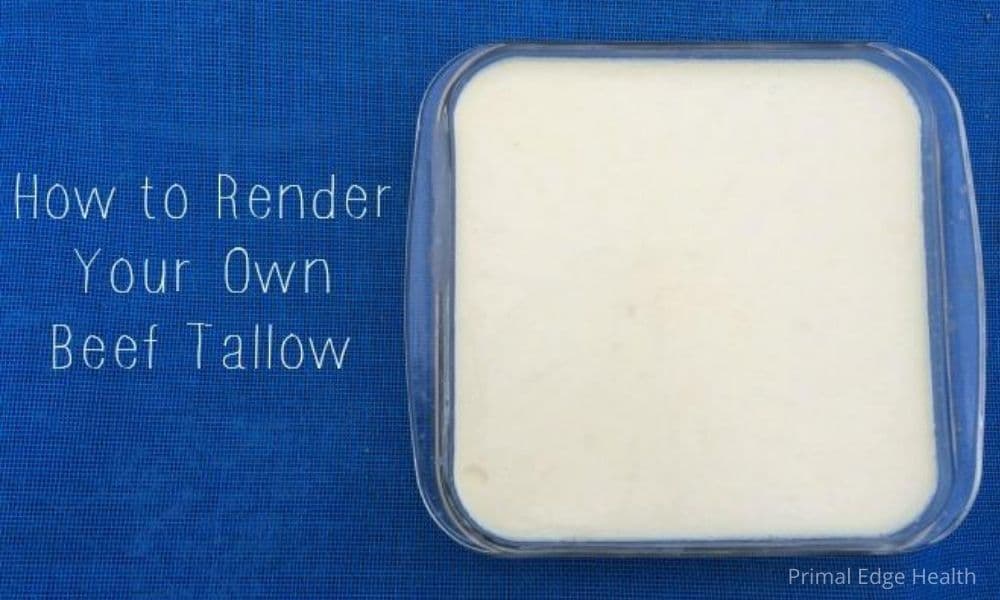Pawsitively Healthy: Bone Broth for Dogs Is a Canine Elixir
Primal Edge Health participates in the Amazon Services LLC Associates Program and other affiliate programs and therefore, may collect a share of sales or other compensation from the links on this page. This comes at no additional cost to you, and all the prices and availability are accurate at the time of publishing.
Have you ever wondered if your furry friend could benefit from the same wholesome elixir that has humans singing its praises? A nourishing cup of bone broth for dogs might be the secret to your dog’s optimal health.
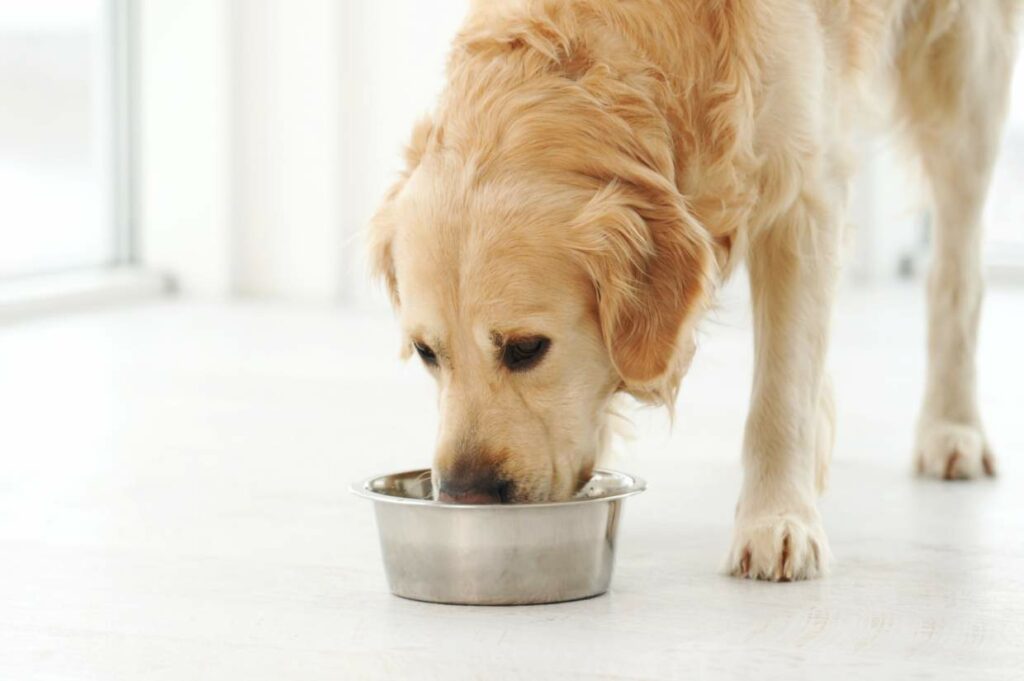
These statements have not been evaluated by the Food and Drug Administration. Please see the disclaimer below for more information.
Table of Contents (click to view)
Benefits for Canine Health
From joint support to better gut health, bone broth may give your dog a range of possible benefits. This section unpacks how bone broth might be a game-changer for your four-legged family member.
Indeed, bone broth, the liquid made by simmering beef or chicken bones in water over a long period, isn’t a cure-all, but it does have a note-worthy nutritional profile. This savory liquid is high in collagen, amino acids, calcium, phosphorus, magnesium, selenium, vitamin A and more, according to the USDA.
- Supports joints: Collagen found in bone broth may help maintain joint flexibility and reduce the risk of arthritis.
- Improves gut health: As demonstrated in a 2014 animal study, the gelatin in broth is generally soothing and healing the gut lining. It may positively remedy a leaky gut, diminish food allergies and reduce digestive issues such as diarrhea or constipation.
- Aids in liver detoxification: Glycine is the essential amino acid that supports liver health. The abundance of glycine found in broth may positively affect detoxification.
- Entices reluctant eaters: You may see bone broth stimulate a dog’s appetite after recovering from illness. It may also lure otherwise picky eaters to their bowl.
- Contributes to hydration: Adding broth to the dog bowl is one way to increase liquid consumption and keep a dog hydrated.
- Improves immune system: Bone broths have minerals like calcium, phosphorus, magnesium, potassium, glucosamine, hyaluronic acid, and collagen. These can help support your dog’s immune system, which is important as they grow older.
- Helps with inflammation: Adding bone broth to your dog’s meal will help their body fight inflammation due to its anti-inflammatory properties.
A 2021 study conclusively states that diet plays an important role in your pet’s health, so choosing wholesome foods does matter. Please consult your veterinarian before introducing any new food into your dog’s diet, especially if they have specific dietary restrictions or health conditions.
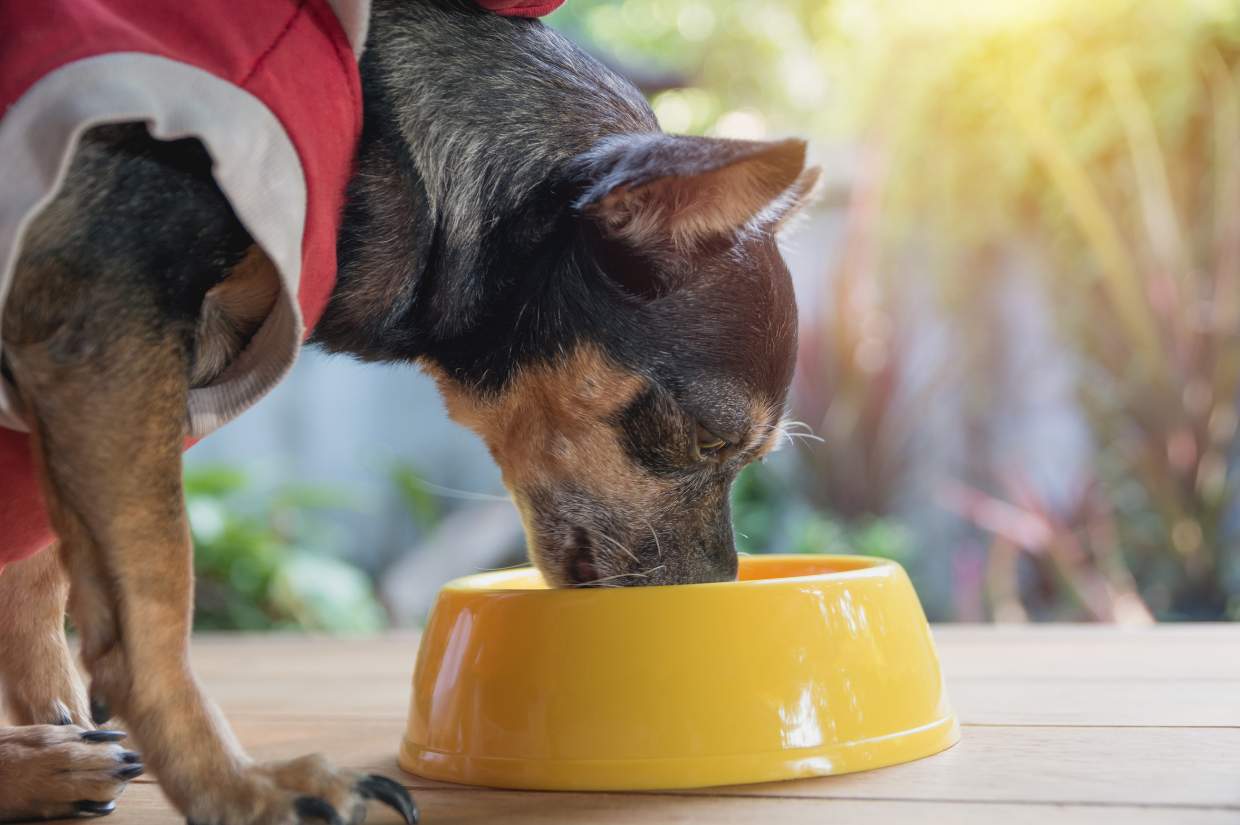
Preparing Homemade Bone Broth for Pups
Homemade bone broth is an excellent option because you can control the ingredients and know exactly what goes in each batch. However, you can also buy pre-made broth at select stores and online if you’re busy or don’t want to fuss over it.
Bone broth for dogs is usually prepared differently than bone broth for humans. Dog broth should be low-sodium, so skip the salt even if it’s a high-quality mineral-rich salt. Furthermore, onion and garlic are typically not given to dogs. Read the ingredient list for your recipe or on the package carefully before serving it to your pup.
“Anytime I make homemade bone broth, I make a small separate batch for the dog using just bones and without flavoring ingredients like onions or garlic. I add it to her regular food, and she gobbles it up even faster than usual. I think it’s one of many things we do that results in her shiny coat, high energy and overall good health.”
– Gina Matsoukas, What Can My Dog Eat?
Here is an easy step-by-step process for making homemade bone broth for dogs. This recipe is good for humans, too.
- Start with about 2 pounds of beef marrow bones, a few carrots, 2 celery stalks and 2 sprigs of rosemary.
- Add the ingredients to a large stock pot. Cover them with approximately 3 quarts of water and bring it to a boil. Then, lower the heat to a simmer and maintain that for 12 hours or overnight. Skim off any foam or impurities that may rise during cooking.
- Remove the pot from heat and let the liquid cool enough to handle.
- Strain the broth through a fine mesh sieve and discard the cooked ingredients. Never feed dogs cooked bones.
- Serve immediately, store portions for the next 3 days in the refrigerator and freeze the leftovers.
You can also adapt this recipe to make slow cooker bone broth or finish it even faster in a pressure cooker. Both alternatives offer the convenience of hands-free countertop cooking.
Simplifying the recipe down to an ultra-simple bone broth with just bones and water can also work. It’s all a matter of preference, so find the best method for you.
Serving Bone Broth to Your Dog
There are a few things to remember when serving a dog broth. First, make sure the broth is completely cool.
Then, decide to use broth as a meal topper by pouring it over their food or serving it on its own as a refreshing drink. Some dogs may also enjoy frozen broth as a treat on a hot day.
Begin slowly and gradually increase the serving size over time. Ask your vet for guidance and lean on their expertise when needed. Remember that bone broth is supplementary feed and not intended as a meal replacement.
As your dog’s palate and tummy get used to something other than kibble, you can also try introducing organ meat to their diet (with their vet’s approval, of course). Organ meat for dogs can lead to better digestive health, higher energy levels, a healthier coat, and other benefits for your pup.

Storing Bone Broth for Future Use
Proper storage is key if you have a large batch of bone broth or want to save portions for later. Allow the broth to cool completely before transferring it into airtight containers or ice cube trays for freezing.
Label each container with the date and contents so that you can quickly identify them later on. Bone broth can last up to 3 months when stored correctly in the freezer.
When ready to use the frozen bone broth, thaw it in the refrigerator overnight or defrost it using gentle heat on the stovetop. By following these simple tips, your dog can get all the benefits of bone broth, and you can seamlessly add the prep into your routine.
“We make a bone broth for our dog once or twice a week, giving him the seconds. We keep the first boil of the chicken, lamb or beef bones for ourselves, then reboil a second time for Bingo. It’s still rich and gelatinous. At age three, we haven’t had any health issues yet. Everyone comments on how amazing his coat looks!”
– Dan Morris, Fire and Saw
FAQs
Bone broth offers numerous benefits to dogs and can be given every day. Be mindful that bone broth is best as a meal topper over regular meals. It is not a suitable meal replacement.
The standard serving of bone broth for a dog is one ounce per ten pounds of body weight. In other words, a dog weighing 100 pounds should receive 10 ounces of food per serving. Slowly incorporate it into your dog’s meal and see how their body will react to the broth.
Most human recipes for bone broth often include onions and garlic. While they can make the bone broth delicious, onions and garlic are toxic for dogs. These ingredients could cause vomiting, diarrhea, reduced appetite, and even damage their red blood cells. If you want to make your bone broth delicious for your dog, stalks of celery and rosemary are enough to give your canine companion’s bone broth some flavor.
Human bone broths are often made with onions and garlic and are saltier. Due to this, it’s not ideal for dog consumption. On the other hand, dog bone broths are made with dog-friendly ingredients. This means it has less sodium and doesn’t have onions and garlic that are toxic to them.
Both bone broth and stock are safe for human consumption. However, stocks – be it chicken or beef – are not ideal for dogs because they tend to be higher in sodium and contain onion and garlic which are toxic to dogs. Stock is also less nutritionally dense than bone broth.
In Conclusion
Bone broth for dogs can be a powerful addition to their diet, offering a range of benefits for their overall health. From promoting joint health and digestion to boosting their immune system, bone broth provides essential nutrients supporting your furry friend’s vitality.
By following the simple steps outlined in this article, you can easily prepare homemade bone broth for your pups and ensure they receive all the goodness it offers. Incorporating bone broth into your dog’s diet is an easy way to enhance their health naturally while providing them with a tasty treat they’ll love.
These statements have not been evaluated by the Food and Drug Administration. The contents of this article, made available via Primal Edge Health, are for informational purposes only and do not constitute medical advice. The content presented here is not intended to be a substitute for professional veterinary advice, diagnosis or treatment. Always seek the advice of a qualified veterinarian with any questions you may have regarding a medical condition or dietary changes. Reliance on any information provided by this article is solely at your own risk.
Parts of this article originally appeared on Food Drink Life.


